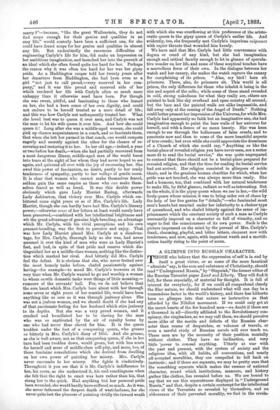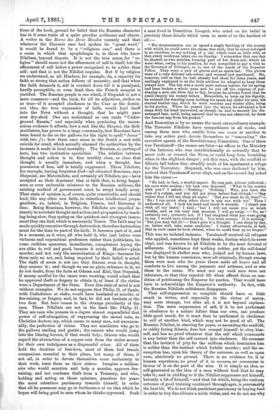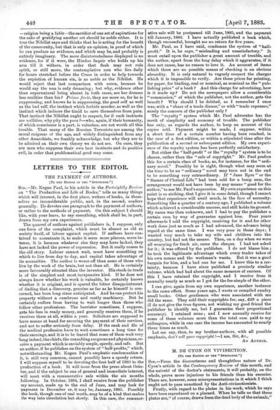A GLIMPSE INTO RUSSIAN CHARACTER.
THOSE who believe that the suppression of self is in and by itself a great virtue, or as some of the more fanatical " altruists" say, is the sum and substance of Christianity, should read" Underground Russia," by " Stepniak," the former editor of the Russian Terrorist paper Land and Liberty. They will find it full, for them especially, of material for thought. It is full of interest for everybody, for if we could all comprehend clearly the Slav nature, we should understand what will one day be a tremendous factor in the world's history, and there has hitherto been no glimpse into that nature so instructive as that afforded by the Nihilist movement. If we could only get at the secret hearts of the few hundred men—we doubt if there are a thousand in all—directly affiliated to the Revolutionary con- spiracy, the ringleaders, as we may call them, we should perceive more alike of the merits and defects of the Russian char- acter than reams of despatches, or volumes of travels, or even a careful study of Russian novels will ever teach us. These men are by the necessity of their position mentally without clothes. They have no inclination, and very little "power to conceal anything. Utterly at war with the past and present, with the system of society and the religious idea, with all habits, all conventions, and nearly all accepted moralities, they are compelled to fall back on instincts ; and if those are separate, we may be pretty sure that the something separate which makes the essence of national character, round which institutions, manners, and history gather like clothes, lies revealed before us. We are bound to say that we see this separateness displayed in " Underground Russia," and that, despite a certain contempt for the intellectual views of the Terrorists as revealed by themselves, and an abhorrence of their perverted morality, we find in the revela-
tions of the book, ground for belief that the Russian character has in it some traits of a quite peculiar nobleness and charm. A writer in the Revue des Dews Mcmcies recently said that whenever the Slavonic race had spoken its " great word," it would be found to be a " religions one," and there is a sense in which that apophthegm is, to those who know Nihilism, beyond dispute. It is not the true sense, for " re- ligion" should mean not the effacement of self in itself, but the effacement of self before a power recognised to be nobler than self; and that is not the Nihilist impulse. But if by religion we understand, as all Hindoos, for example, do, a capacity for faith so strong that action follows of necessity, and that when the faith demands it, self is crashed down till it is paralysed, hardly perceptible, or even dead, then the French essayist is justified. The Russian people is one which, if Stepniak is not a mere romancer—and the book, for all its adjectives, strikes us as true—if it accepted obedience to the Czar as the domin- ant idea, the true expression of faith, would hurl itself into the Neva without a thought, that he might pass over dry-shod. One can understand as one reads "Under- ground Russia," and especially when pondering the uncon- scious evidence it affords, how a sect like the Skoptzi, the Self- mutilators, has grown to a large community, how Russians have been found to die on the gallows for the right to spell " Jesus " with two j's; how there once arose in the South a sect with suicide for creed, which actually alarmed the authorities by the increase it made in local mortality. The Russian, as portrayed here, has two instinctive specialties. The relation between thought and action is in him terribly close, so close that thought is usually immature, and when a thought has possession of him, self is totally suppressed. These Nihilists, for example, having forgotten God—all educated Russians, says Stepniak, are Materialists, and certainly all Nihilists are—have accepted as their dominant idea or faith that, to bring happi- ness or even endurable existence to the Russian millions, the existing method of government must be swept totally away. That state of opinion is, of course, quite conceivable, and should lead, like any other new faith, to relentless intellectual propa- gandism, as, indeed, in Belgium, France, and Germany it does. Being Russians, however, the Nihilists are impelled in- stantly to correlate thought and action, and propagation by teach- ing being slow, they spring on the quickest and strongest instru- ment they can find, which is necessarily Terror. The faith may be made quickly executive through destruction, therefore destruction must for the time be part of the faith. It becomes part of it, and in a moment, as it were, all who hold it, who just before were virtuous and unpractical professors rather than politicians, be- come ruthless assassins, incendiaries, conspirators laying the axe alike to evil and good, because it exists. Murder—plain murder, and not only the assassination of Kings—becomes for them only an act, and, being required by their belief, is acted. The right of arson is not one they discuss even in thought, they assume it ; and though we see no plain reference to it, we do not doubt, from the facts at Odessa and Kief, that Stepniak, if money needful for the cause were wanting, would admit that he approved theft or forgery to obtain it, at least if the victim were a Department of the State. Even this state of mind is not without examples. We do not suppose that Philip IL of Spain, with Catholicism at stake, would have hesitated at murder, or fire-raising, or forgery, and, in fact, he did not hesitate at the two first. But here comes in the strange peculiarity of the case. These Nihilists are not in the least like Philip II. They are men who possess in a degree almost unparalleled that power of self-abnegation, of suppressing the carnal man, as Christian doctors say, which seems to many men, not unreason- ably, the perfection of virtue. They are murderers who go to the gallows smiling and gentle ; fire-raisers who would jump into the blazing houses, if that would help ; thieves who would regard the abstraction of. a copper coin from the stolen money for their own indulgence as a disgraceful crime. All of them hold the doctrine of free-love, most of them find female companions essential to their plans, but many of them, if not all, in order to devote themselves more exclusively to their work, treat them as their sisters. Imagine a million- aire who would sanction and help a murder, approve fire- raising, and not condemn theft from a Treasury, and who, holding and acting on those opinions, practises for years the most relentless parsimony towards himself, in order that all he possesses may go in fartherance of an idea which be hopes will bring good to men whom he thinks oppressed. Such a man lived in Demetrius Lisogub, who acted on his belief in precisely those details which seem to most of us the hardest of all :—
" His determination not to spend a single farthing of the money with which he could serve the cause, was such, that he never indulged in an omnibus, to say nothing of a cab, which costs so little with us that every workman takes one on Sunday. I remember that one day he showed us two articles, forming part of his dress-suit, which he wore when, owing to his position, he was compelled to pay a visit to the Governor of Cernigov, or to one of the heads of the Superior Police. They were a pair of gloves and an opera-hat. The gloves were of a very delicate ash-colour, and seemed just purchased. He, however, told us that he had already had them for three years, and smilingly explained to us the little artifices he adopted to keep them always new. The hat was a much more serious matter, for its spring had been broken a whole year, and he pat off the expense of pur- chasing a new one from day to day, because he always found that he could employ his money better. Meanwhile, to keep up his dignity, he entered the drawing-room holding his opera-hat under his arm, his eternal leather cap, which he wore summer and winter alike, being in his pocket. When he passed into the street, he advanced a few steps with his head uncovered, as though he had to smooth his dis- arranged hair, until, being assured that he was not observed, he drew the famous cap from his pocket."
And Demetrius is by no means the most extraordinary example. The Terrorist Nihilists have sympathisers in all ranks, and among them men who, unable from one cause or another to take any active part, devote themselves to " concealing " the executive agents of the Revolutionary Committee. One of these
was Tarakanoff—the names are false—an officer in the Ministry of the Interior, who was constitutionally so cowardly that he never rode or crossed the Neva, or could keep from trembling when in the slightest danger ; yet this man, with the scaffold or Siberia full before him, steadily made of his apartment a refuge for the Terrorists. Stepniak, who was once sheltered by him, noticed that Tarakanoff never slept, and on the second day asked him the cause :— "He had, in fact, a woeful aspect. He was pale, almost yellowish ; his eyes were sunken ; his look was dejected. What is the matter with you ?' I asked.—' Nothing.' Nothing ! Why, you have the face of a corpse, and you did not sleep before four o'clock.'—' Say rather that I did not sleep all night." But you must be ill, then?'— `No; No; I can never sleep when there is any one with me.' Then I understood all. I took his hand and shook it warmly. ' I thank you with all my heart,' I said ; bat I will not cause you so much trouble, and at the very first moment I will go away.'—' No, no! certainly not ; certainly not. If I bad imagined what you were going to say, I would have concealed it. You must remain. It is nothing.
But you may fall Don't give it a thought. I can sleep by day, or, better still, take some medicine.' I learnt afterwards, in fact, that in such cases he took chloral, when he could bear up no longer."
This was no isolated instance. Tarakanoff received all refugees who applied, sometimes kept them weeks, during which he never slept, and was known by all Nihilists to be the most devoted of
adherents. Casablanca did nothing nobler, yet the self-denial was displayed to shelter men who, judged not by human laws, but by the human conscience, were all criminals, though among them were men who for years threw aside all hopes and all comforts to live among the peasants and artisans, and so win them to the cause. We need not say such men were net informers, or that they rejected life when offered them on con- dition of petitioning the Emperor for pardon. That would have been to acknowledge the Emperor's authority. In fact, with the Russian Nihilists selfishness disappears.
That self-suppression so complete should have so little result in virtue, and especially in the virtue of mercy, may seem strange, but after all, it is not beyond explana- tion. The mere suppression of self, if it be not performed in obedience to a nature loftier than our own, can produce little good result, for it must then be performed in obedience to self of another kind, which may not be good at all. The Russian Nihilist, in starving for years, or ascending the scaffold, or coldly facing Siberia, does but compel himself to obey him- self, and has no proof whatever that the self which commands is any better than the self coerced into obedience. He assumes that the instinct of pity for the millions which dominates him is nobler than the instinct which forbids murder; and the as- sumption has, upon his theory of the universe, as well as upon ours, absolutely no ground. There is no evidence for it in human experience, no proof of it in success, no consensus in favour of it on the part of the wise. It is simply an idea, as self-generated as the idea of a man without food that he may take it ; and in yielding to it the Nihilist suppresses not himself, but only a bit of himself,—and that bit which, being the uniform outcome of good training continued through ages, is presumably the best bit. We do not think persistent parsimony in buying food in order to buy fine ribbons a noble virtue, and we do not see why
—religion being a fable—the sacrifice of one set of aspirations for the sake of gratifying another set should be noble either. It is true the Nihilist says and thinks that he is acting for the benefit of the community, but that is only an opinion, in proof of which he can produce no evidence, and which may be, and probably is entirely imaginary. The mere disinterestedness displayed is no evidence, for if it were, the Hindoo faquir who holds up his arm till it withers, in order that flesh may not rule spirit, or still more, the contemplative nun who lies daily for hours stretched before the Cross in order to help towards the expiation of human sin, is as noble as the Nihilist. He would reject that last comparison with scorn, because he would say the nun is only dreaming ; but why, evidence other than supernatural being absent in both cases, are her dreams less realities than his ? Prima fade, they are more so, for he is suppressing, and knows he is suppressing, the good self as well as the bad self, the instinct which forbids murder, as well as the instinct which induces the timid to save themselves from pain. That instinct the Nihilist ought to respect, for if such instincts are nullities, why pity the poor ?—who, again, if their humanity, of which conscience is a part, is valueless, are not worth all this trouble. That many of the Russian Terrorists are among the moral enigmas of the age, and widely distinguished from any other Anarchists, we frankly acknowledge, but why they are to be admired on their own theory we do not see. On ours, they are men who suppress their own best instincts and do positive evil, in order that problematical good may come.




































 Previous page
Previous page